Existing User Log In
New User Registration
Register for a free account to gain full access to the VGChartz Network and join our thriving community.



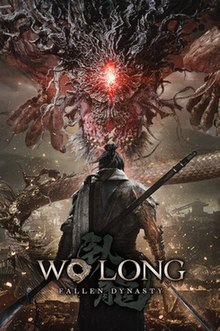

America - Front
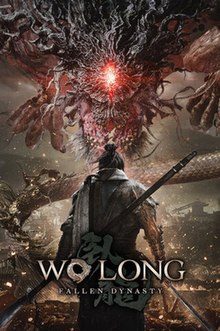

America - Back

Team Ninja
Role-Playing
 (Add Date)
(Add Date) (Add Date)
(Add Date) (Add Date)
(Add Date)
| Owners: | 0 |
| Favorite: | 0 |
| Tracked: | 0 |
| Wishlist: | 0 |
| Now Playing: | 0 |
Like many of our Elden Lord brethren, I've eagerly awaited the release of Wo Long: Fallen Dynasty. Team Ninja's spiritual counterpart to FromSoftware's Sekiro: Shadows Die Twice shares most of the traits of its ancestors, bringing innovations that attempt to spruce up an aging formula that's in need of a makeover. And while no doubt a fine game by modern standards, for longtime players Wo Long comes off as a stopgap between major projects. Despite possessing the potential to do so, it doesn't nearly re-invent the wheel as much as it could, making what's new seem more experimental than something that resulted from years of impassioned development.
Taking a much-needed break from the Sengoku period of Japan, Wo Long looks back further in time and travels westward to the Three Kingdoms era of China's development. Sadly, this potential quickly dissipates into a pastiche of Nioh 2: the Daoist in Black is clearly based on Otakemaru; the silent protagonist derives from the Shiftling; and most significantly, instead of participating in a demon-infested civil war between rival factions, we'll be engaging in monster-filled battles of secession amongst competing states. Once the whole 'absorbing spirit animals of former enemies turned allies' motif showed up, I stopped trying to follow the narrative and determined that I can do anything as long as I have friends. I suppose if FromSoftware and George R.R. Martin can't generate a decent story for these kinds of games, I shouldn't expect anything better from Team Ninja. I don't need God of War: Ragnarök, but the vague, paper-thin motivations that plague the protagonists in this genre definitely need more attention.
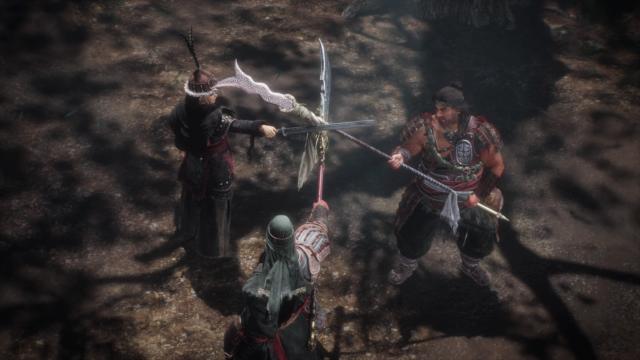
When it comes to the gameplay, Wo Long's progress is bittersweet. Though the improvements to exploration are welcome, as far as combat is concerned these additions lack significant impact. Furthermore, for a game that prides itself on accessibility, it does a remarkable job of taking what was already established and making it more convoluted.
Team Ninja has a strange fixation concerning stamina gauges. The 'Ki Pulse' introduced in Nioh was a simple yet incredibly effective way to revamp the flow of combat. 'Spirit Gauge' attempts to improve on this equation with mixed results. Depending on the decisions made in a fight, Spirit can be taken away (the same consequences blocking has on stamina) but also gained in excess, 'overcharging' the meter, so to speak. As special types of actions like casting spells, rallying troops, performing Martial Arts (Ashes of War), and using Spirit Attacks (R2 strong attacks) all consume this same resource, its management is paramount. And though consolidating the magic and stamina meters is interesting, it sometimes comes off as unnecessary.
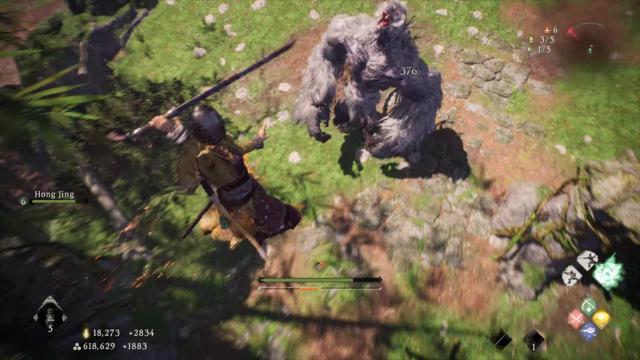
Deliberately mapped to opposing buttons, the differences between defensive options seem like a compromise between developers. While blocking confers the same advantages (and detriments) as it does in any dark-fantasy game of the past decade or so, 'Deflecting' opens an entirely new avenue to offense. Virtually every attack in Wo Long can be deflected, allowing players to stand their ground and increase Spirit while simultaneously lowering their enemies', sealing off a section of their meter. Should the ends of the Spirit Gauge fill completely, a devastating Fatal Strike can be performed.
In reality, this system is similar to what was established in Demon' s Souls, but with more effort attached than usual. Don't get me wrong: between the parries of Street Fighter III, 'Just Defending' in Mark of the Wolves, 'issen'-attacks from Onimusha, and Devil May Cry 3's Royal Guard style, I love these kinds of mechanics. But when anything can be deflected, defense quickly becomes the best offense, undermining the genre's core philosophy. It gets to the point (especially in boss fights) where one of the strongest tactics a player can employ is to stand there and do nothing. Once a pattern is learned, it becomes a simple matter of fishing for opportunities; at what point does the ability to parry/deflect turn an action RPG into Dance Dance Revolution or Hatsune Miku? By the time I beat Wo Long, I had used the block button a grand total of once throughout the entire adventure – and it was an accident. Deflecting seven attacks in a row is undeniably cool, but when it allows you to ignore an entire defensive facet of battle, to say that it's overpowered is an understatement.
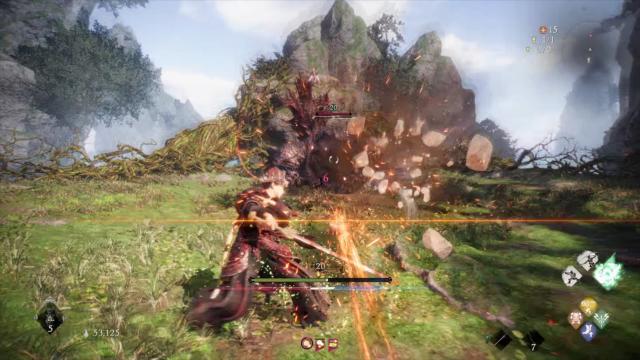
The greatest contribution to progress comes from Wo Long's 'Rank' system. There are two types to raise, creating additional avenues to increase the strength of your character. Though this goes some distance to help in terms of accessibility, what it boils down to is essentially a second (and third) form of leveling up. This is easily the most intriguing aspect of the game, it just doesn't run far enough with the concept.
A character's Morale Rank is a representation of their overall battle prowess. Gained (and lost) primarily through combat, a higher Morale Rank is required to access certain spells and take on stronger enemies. Truth be told, a mechanic like this has the potential to revolutionize the entire genre – if it wasn't held back by the trappings of the past. Outside of what magic can be used, having a Morale Rank of 22 is functionally little different than a rank of 5; you might be able to take some extra hits and kill enemies faster, but it rarely feels like you 'ascend' to a new plateau. It's almost as if Team Ninja stepped away from the precipice and slapped a standard leveling system onto Wo Long to compensate, in lieu of wholly devoting to the process. Morale Rank should receive top billing; instead, it becomes a featured player in its own show.
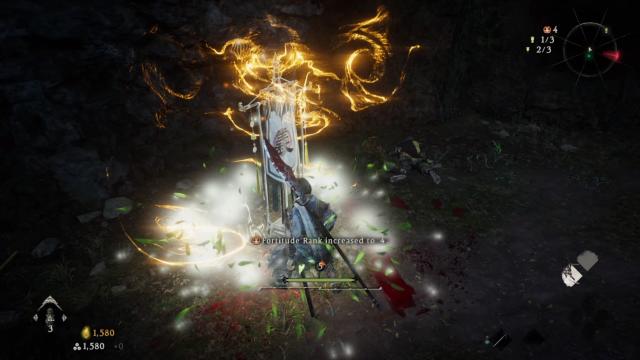
Complementing this is a character's Fortitude Rank. Symbiotically connected to Morale Rank, Fortitude Rank acts as a safeguard of sorts, helping players acquire status through indirect means. Inspired by the Kodama in Nioh, Fortitude Rank is gained by planting 'Battle Flags' throughout an environment. In doing so, your minimum Morale Rank will default to the Fortitude Rank if killed in battle, bridging the threshold of difficulty. Though speed-runners and more familiar players will eventually be able to ignore it altogether, Fortitude Rank lurks in the background for those who seek to take advantage of it. As I've mentioned before, despite their mission-based structure, Team Ninja games tend to offer far more of a reward for exploring the environment than their contemporaries.
Reminiscent of the Spirit Ashes from Elden Ring, 'Reinforcements' summons allies for an excursion. Not only do your buddies party up for an entire mission, they're also far easier to maintain and keep around. Up to two A.I. friends can join in on the fun, who have various affinities with each other, the player character, and Elemental Virtues (stats) they adhered to. Though it's a great idea, the execution is somewhat clunky and not as robust as it initially appears.
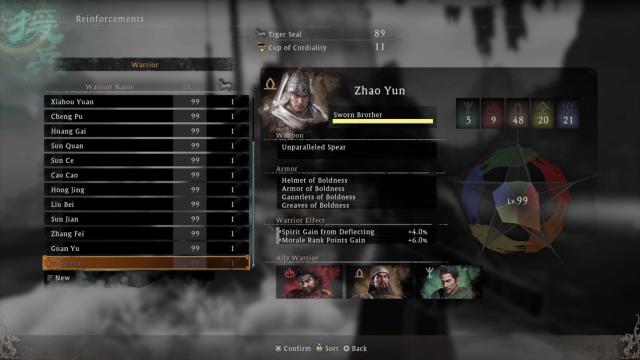
My biggest gripe is that, without direction, allies have a habit of half-heartedly participating in combat. When someone says: “I've been waiting for this battle my entire life!”, I didn't actually think they intended on standing there watching me being bludgeoned to death. After prompting them with a 'Rally' command, allies are certainly capable to doling out some punishment, but it's surprising how apathetic everyone can be about protecting their homeland.
The 'Oath Bond' system is also occasionally redundant. Establishing a deeper connection with an ally (requesting assistance) increases their affection towards the player and improves technique. Upon becoming a 'Sworn Brother', the NPC bestows a copy of their equipment set to use. I enjoy the consideration, but after being gifted my first set, a stronger version of the weapon dropped off a random monster within minutes. I know it's the thought that counts, I just felt bad about taking the 'Unparalleled Spear' my Sworn Brother gave me and converting it into salvage like everything else.
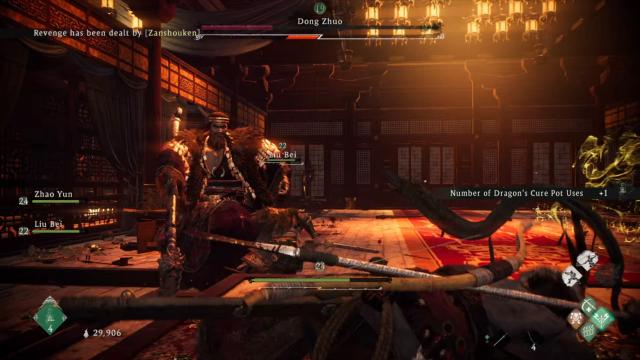
Martial Arts are analogous to the Ashes of War from Elden Ring, replacing the weapon techniques from Nioh. Whether it's a personal buff or some form of multi-hitting attack, players can tailor their build using these randomly acquired skills. I haven't discovered anything along the lines of 'Hoarfrost Stomp', but that doesn't necessarily mean it's not out there.
Magic is another mixed blessing. While certainly powerful with the right combination and devotion to a particular Elemental Virtue, the fact that you can only have four out of a possible seventy spells equipped at a given time greatly restricts the pool of possibilities; Alacrity Haste, Life Wither, Absorb Vitality, and Enhanced Defense are solid choices when exploring the environment, whereas Focus Zone, Overpower Burst, and Heaven's Rage have application against large bosses. There's quite a bit of customization when it comes to magic, but with such a limited loadout, you need a good read on the situation and decent spread across disciplines to make the most of it.
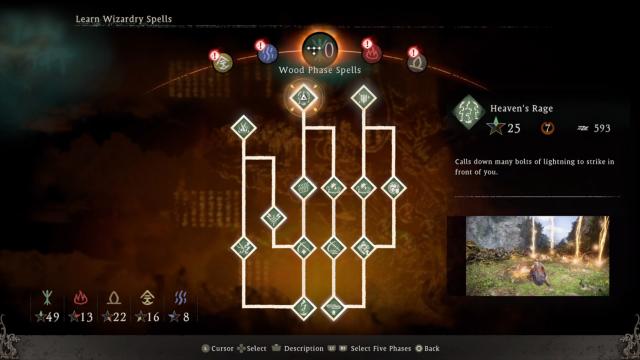
The consequences of this can be seen in regard to 'Elemental Counters'. Each Virtue trumps another and in turn, falls to a third: Wood beats Earth but loses to Metal; Water is vulnerable to Earth, yet defeats Fire. If a Metal spell is used, casting Fire magic in retaliation completely negates its effects. Like the Rank system, an all-encompassing mechanic such as this could potentially reinvigorate the genre. Again, Team Ninja backs away on what should be one of the game's strongest features. With four slots for magic (which is dependent on Morale Rank to utilize), Elemental Counters are noteworthy, but can be practically ignored for initial playthroughs.
One area where Wo Long doesn't pull any punches is its equipment customization. Most of the convoluted processes from Nioh have been replaced with a system reminiscent of Skyrim, where effects that are removed from gear become part of a collective that can be plugged in at will. Best of all, almost every slot on an item can be swapped out with beneficial modifiers from the start. Enjoy using your Spirit Animal/Devil Trigger buff? Slap some Divine Beast Gauge Gain on your armor for a good 10-15% additional meter per strike. Having fun with lightning magic? Additional 'Shock' status accumulation and a couple of Lightning Damage+18 will help lower those life bars. It might not be as dynamic as what's come before, but the process of creating desirable gear has never been easier.
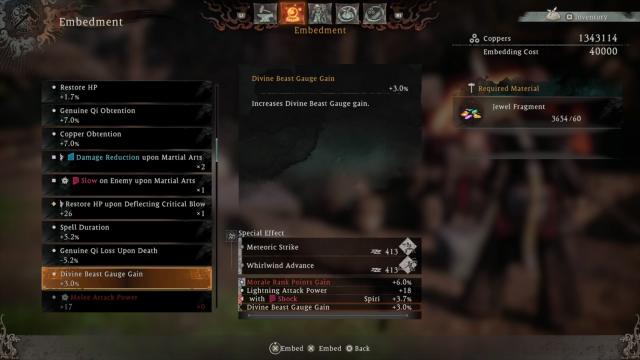
From there, Wo Long hosts the standard Souls-like fare: co-op, invasions, and New Game+. Though having three human combatants feels unfair in PvE (and always has), a 'Level Sync' feature exists to keep the playerbase united, which I'm always in favor of. Deflecting brings an interesting layer to PvP, but like Elden Ring, invaders may have to accept being frequently outnumbered. New Game+ continues Nioh's tradition of increasing the drop rate of rare items, alongside restraining the bonuses granted by Fortitude Rank; one must become master of both exploration and inflicting Fatal Strikes to ensure a boss' Morale Rank stays within acceptable range of the player. An impending Season Pass will assuredly open things up throughout the year, but other than sub-missions, Wo Long is currently lighter on content than some might be expecting.
If anything, it's the smaller inclusions that win me over. When someone else defeats an enemy that previously killed you, a potion (if it can be held) is restored to your belt. Conversely, potions can be donated to the gravestone of a fallen compatriot, directly helping to fund their cause. I can think of at least two boss fights where the tide was turned thanks to these mechanics. The game's soundtrack is also a step above Nioh, ironically coming closer to replicating the original score of Onimusha: Warlords, despite stepping away from its setting. And though I hate to admit this professionally, I like how painless being able to respec your character is these days; the old-school RPG fan in me may balk, but it's nice having all your options on the table at will.
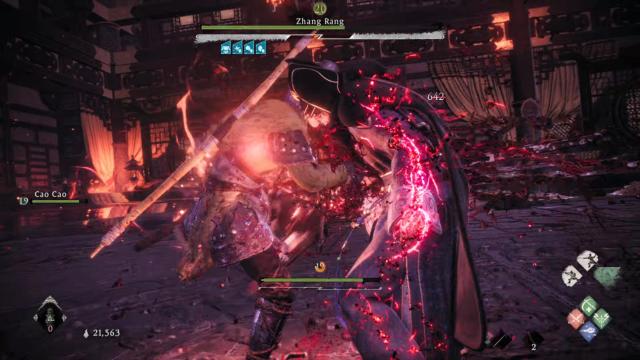
I come off Wo Long: Fallen Dynasty less enthusiastically than I was anticipating. While a good game by any consideration (and quite fun), something tells me it could be more than it is. If this was a 'true' 9th generation offering that went down the 'more action, less RPG' route, I might be more forgiving, but Wo Long shouldn't have ended up as a Nioh 3 or Nioh Jr. – it's supposed to be Wo Long. Worse is that all the pieces to make it stand out are in plain sight, it's just that the developers didn't see them through to their potential. The Morale/Fortitude Rank system is fantastic, yet should have been implemented as the sole means of getting stronger. Restraining what magic can be used based on Rank would be a great way to create various types of builds, but only allowing a select few spells to be used at a time hampers the possibilities. And though deflecting everything in sight is cool, without more consequences it becomes abusable and overpowered. I remember wishing for something similar in Sekiro; now that I have it, I appreciate the wisdom of the sweep/parry/grab triangle FromSoftware established.
Wo Long is certainly worth a playthrough or two. Xbox players who missed out on Nioh will get the most here, though veteran players might view it as a means to pay the bills rather than someone's passion project. Like Strangers of Paradise, Wo Long enters the increasingly populated sea of good Souls-like games, but for the moment, we'll be waiting on Rise of the Ronin to deliver that next-gen experience we're all starting to get anxious for.









